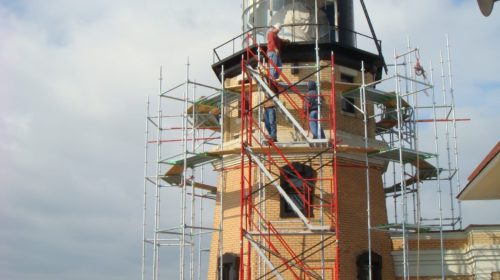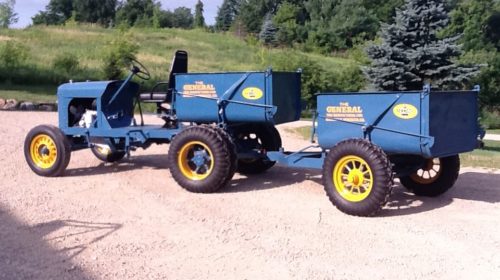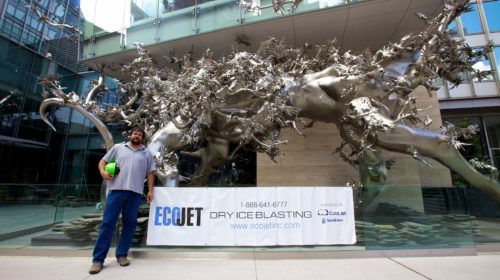
Dry Ice Blasting Safely Cleans Largest Wooden Structure in Europe
THE SITUATION
Located in the forests of Vlodrop, Netherlands is a 9,000 square foot wooden structure built without a single nail. The building, considered one of the largest wooden structures in Europe, was once the home of Maharishi Mahesh Yogi, the founder of Transcendental Meditation (TM), and today is the European headquarters of TM. It is also used as a seminar center by the Maharishi European Research University (MERU). For Maharishi’s Vedic architectural principals, building a home is more than assembling four walls, it is about structuring a building in such a way that it is in perfect harmony with its environment in accord with natural laws, “optimizing both the close and distant positive environmental influences on the individual.”
THE PROBLEM
On July 22, 2010, TM celebrated its 50th anniversary in Germany. In preparation for the celebration, TM wanted to refurbish the building’s East façade, including all the balustrades and planters, which would need to be disassembled for cleaning and painting.
Similar to the process of building a Vedic structure, which requires the right direction, right placement of rooms, right proportions and natural, non-toxic materials, cleaning and restoring the building also required the right solution that was in accordance with TM’s philosophy on the laws of nature. Adding to the complexity of the project was the size of the building, the project deadline, the surrounding gardens and vegetation, its location and the natural elements’ impact on the wood. Since 2002, the building has gone untreated, resulting in the wood being affected by mold, moss and dirt.
After considering multiple cleaning options, including sand blasting, water blasting and polishing, TM selected dry ice blast cleaning. Performing the work was HS Dryice Blasting, a German contract cleaning company and user of Cold Jet technology.
THE SOLUTION
“This was a challenging project given the massiveness of the façade, the impact of the humid forest conditions on the building’s untreated exterior and the tight timeline,” stated Georg Schulz of HS Dryice blasting. “After receiving approval for the project, we had four weeks to get the work done. We used Cold Jet’s cleaning systems because they consistently deliver good results and were able to continue blasting for hours to help us meet the requested deadline.”
Dry ice cleaning uses reclaimed CO2 in the form of dry ice pellets to remove dirt and contaminates from surfaces being cleaned. Accelerated using pressurized air streams, the pellets sublimate upon contact, lifting the dirt and eliminating any secondary waste. It is a non-abrasive, non-flammable and water-free cleaning solution, which are critical benefits for cleaning an untreated wood structure.
“We selected dry ice blasting because unlike sand and water, dry ice blasting does not generate any secondary waste that could potentially contaminate the garden in the front of the building,” said project manager Rolf Kiupel. “The home was built on the principle of Maharishi Sthapatya Veda, which is architecture in harmony with the laws of nature. Given that dry ice blasting is an environmentally responsible cleaning solution, it was the only option for this restoration project.”
THE RESULTS
Cold Jet’s dry ice blasting systems were able to remove the mold, moss and dirt from the façade. The dry ice particles cleaned without any by-product and eliminated the added costs and environmental impact of secondary waste treatment and disposal. In addition, Cold Jet’s systems were able to remove the contaminants without damaging the wood, providing a prepared surface for a wood preservative and three layers of paint, which were applied following the cleaning process.
According to Schulz, “MERU was extremely satisfied with the results, and the building looked great for the celebration.”
By using Cold Jet’s cleaning systems, HS Dryice Blasting was able to remove mold, dirt and other contaminants without damaging the wood surface.

